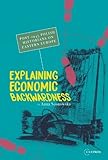Explaining economic backwardness : post-1945 Polish historians on eastern Europe / Anna Sosnowska.
Material type: TextLanguage: English Original language: Polish Publication details: Budapest ; New York : Central European University Press, (c)2019.Edition: English-language editionDescription: 1 online resource (vi, 366 pages) : illustrationsContent type:
TextLanguage: English Original language: Polish Publication details: Budapest ; New York : Central European University Press, (c)2019.Edition: English-language editionDescription: 1 online resource (vi, 366 pages) : illustrationsContent type: - text
- computer
- online resource
- 9789637326318
- 9637326316
- Post-1945 polish historians on eastern Europe
- Post nineteen forty five Polish historians on eastern Europe
- HN380 .E975 2019
- COPYRIGHT NOT covered - Click this link to request copyright permission: https://lib.ciu.edu/copyright-request-form
| Item type | Current library | Collection | Call number | URL | Status | Date due | Barcode | |
|---|---|---|---|---|---|---|---|---|
 Online Book (LOGIN USING YOUR MY CIU LOGIN AND PASSWORD)
Online Book (LOGIN USING YOUR MY CIU LOGIN AND PASSWORD)
|
G. Allen Fleece Library ONLINE | Non-fiction | HN380.7.8 (Browse shelf(Opens below)) | Link to resource | Available | on1078953916 |
Includes bibliographies and index.
This monograph is about an exciting and valuable string in the intellectual history of Eastern Europe: the debate of leading Polish historians on the origins of the economic divisions within Europe. The work covers nearly fifty years that span between the publication of two pivotal works in 1947 and 1994. The author focuses on the works of four leading participants in the debate, Kula, Małowist, Topolski and Wyczański. The analysis provides an insightful interpretation of how local and generational experience shaped the post1945 Polish historians' notion on Eastern European backwardness, and how their debate on backwardness influenced Western historical sociology, discussion on origins of capitalism, social theories of development and dependency in peripheral areas, and image of Eastern Europe in western, Marxisminspired social science. Although created under the pressure of the adverse conditions of state socialism, censorship in particular, this scholarship, with its emphasis on international comparisons and global perspective, as well as its stress on social theory and explanations, is an important part of social science of the postwar period. Its analysis helps also to understand current differences that occasionally lead to conflicts between Europe's richest and economically most developed core and its southern and eastern peripheries.
COPYRIGHT NOT covered - Click this link to request copyright permission:
There are no comments on this title.
